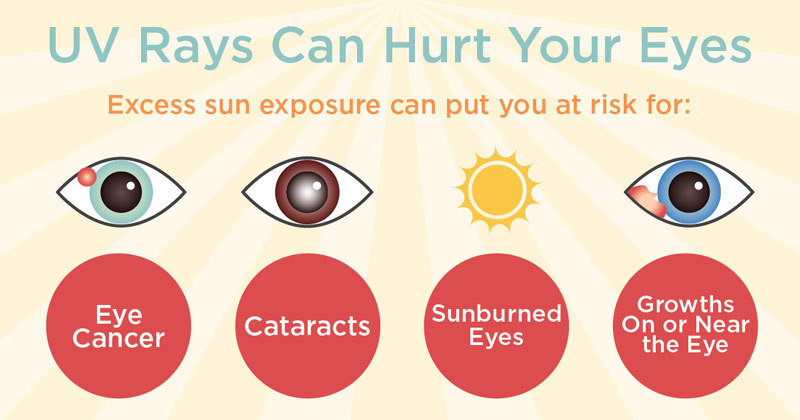
by admin | Apr 14, 2020 | Blog, News
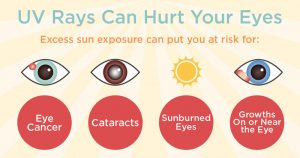
Summer and warmer weather are fast approaching. Most of us remember to wear sunscreen to protect our skin from sun damage, but it’s important to protect our eyes as well.
Excess sun exposure can put you at risk for eye cancer, sunburned eyes, cataracts, and growths on or near the eye. [Infographic above illustrates the same information].
How can you protect your eyes? Follow these guidelines:
Wear sunglasses labeled “100% UV protection”: Use only glasses that block both UV-A and UV-B rays and that are labeled either UV400 or 100% UV protection.
- Choose wraparound styles so that the sun’s rays can’t enter from the side.
- If you wear UV-blocking contact lenses, you’ll still need sunglasses.
Wear a hat along with your sunglasses; broad-brimmed hats are best.
Remember the kids: It’s best to keep children out of direct sunlight during the middle of the day. Make sure they wear sunglasses and hats whenever they are in the sun.
Know that clouds don’t block UV light: The sun’s rays can pass through haze and clouds. Sun damage to the eyes can occur any time of year, not just in summer.
Be extra careful in UV-intense conditions: Sunlight is strongest mid-day to early afternoon, at higher altitudes, and when reflected off of water, ice or snow.
By embracing these simple tips you and your family can enjoy being in the sun safely while protecting your vision.
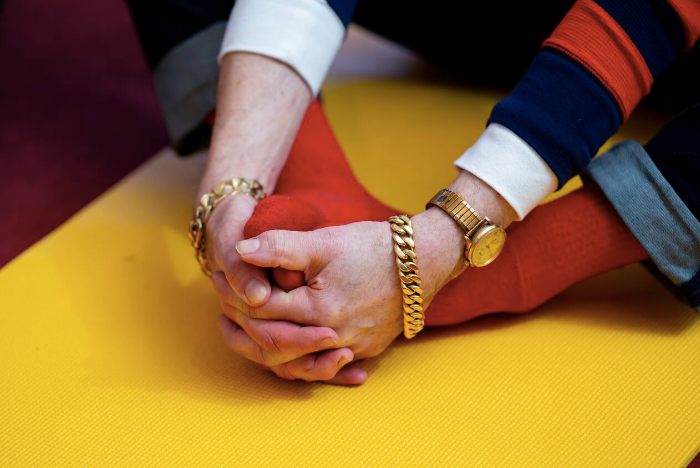
by admin | Apr 6, 2020 | Blog, News, Program
Vision Loss Alliance of New Jersey is pleased to announce the opening of our new virtual classroom!
As part of our Beyond Sight series of programs we are offering Meditation and Mindfulness, an online class to help you cope with the stresses of everyday life. This class will be held at 1:30pm EST on Tuesdays from April 7, 2020 to April 28, 2020 using the Zoom meeting platform.
There is no cost to participate, however registration is required and seating is limited. Register in advance by clicking on the following link: Zoom Meeting.
After registering, you will receive a confirmation email containing information about joining the meeting. We look forward to having you in our classroom!
Would you like more information? Send us an email at beyondsight@vlanj.org.
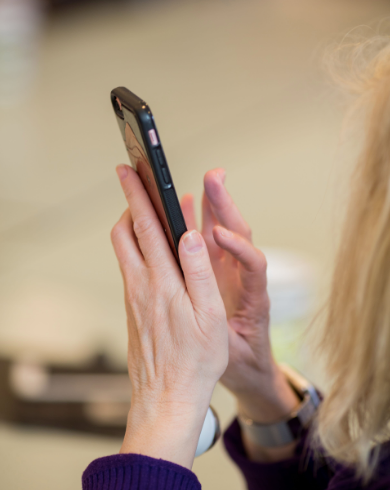
by admin | Mar 27, 2020 | Blog, News
March is workplace eye wellness month. Since most of us are now working from home, here are some things to look out for at your home office.
💻 Digital eyestrain – Fatigue, dry eyes, bad lighting, or how one sits in front of the computer can cause eyestrain. Symptoms of eyestrain include sore or irritated eyes and difficulty focusing.
⚠️ Retina damage – Studies suggest that continued exposure to blue light over time could lead to damaged retinal cells. This can cause vision problems such as age-related macular degeneration or cataract. Blue light is emitted from all the screens in your home like TVs, computers, iPads and phones, as well as LED and fluorescent lights.
The remedy? Limit your screen time! 📱
If you have to work on a screen, make sure the distance from the eye to the front surface of the computer screen is 20-40 inches.
Work in a well-lit room.
Take frequent eye 👀 breaks (every 30 minutes or so).
Lastly, make sure to spend some time outdoors 🌳 and wear sunglasses when it’s sunny out! 🕶️
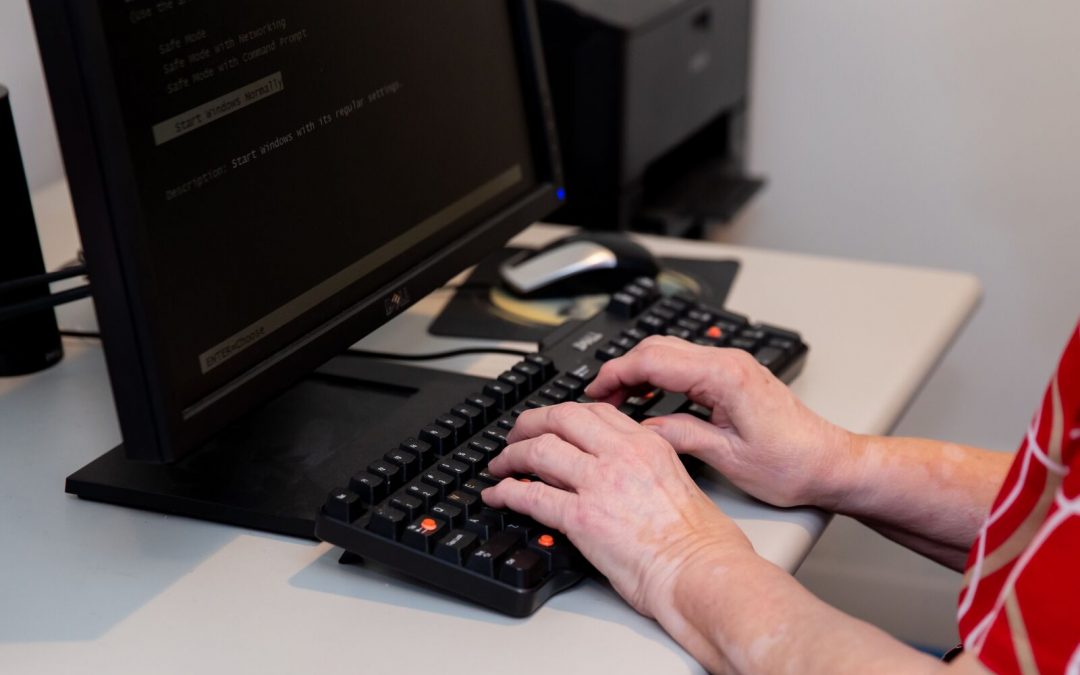
by admin | Mar 27, 2020 | Blog, News
Tax season is almost upon us – the deadline for filing is on April 15th, 2020.
Did you know you can claim an additional $1,000 exemption if you were considered legally blind on the last day of the tax year?
If you are married (or in a civil union) and are filing jointly and your spouse was considered legally blind on the last day of the tax year, they can claim an additional $1,000 exemption.
To claim these exemptions (for the first time), medical proof must be enclosed with your paper tax return. Documentation may be required at a later time if filing electronically.
What works as proof? A letter from your doctor stating that you are legally blind typically suffices. You can continue to claim the exemption in subsequent years without needing proof, if there is no drastic improvement in your ability to see.
Note that this exemption can not be claimed for a domestic partner or for your dependents.
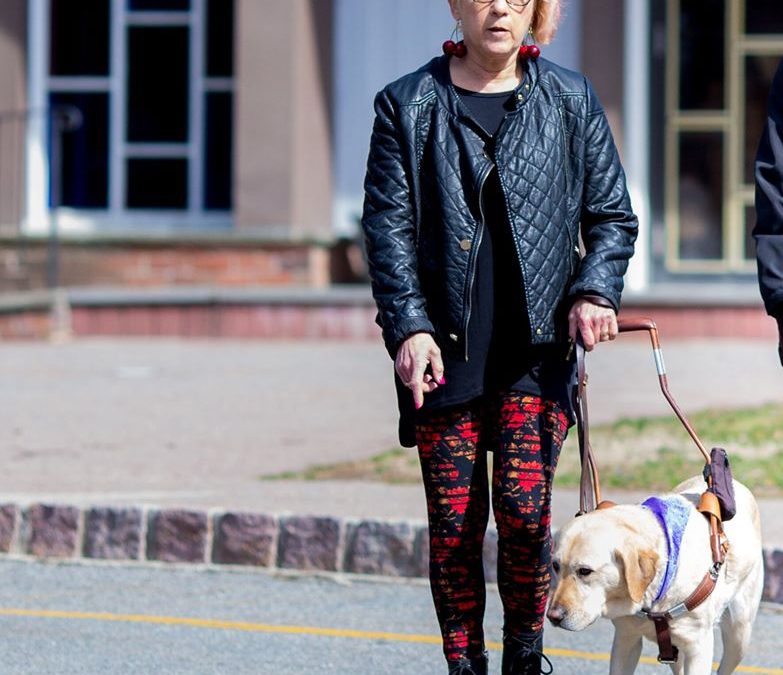
by admin | Mar 22, 2020 | Blog, News
Courtesy tips for helping people who are blind or have low vision, when they go outside!
- When they ask you for directions, make sure to be as descriptive as possible.
- Use words such as “straight ahead,” “turn left,” “on your right.”
- Don’t point and say, “Go that way,” or, “It’s over there.”
- Let the person know about any crosswalks, road barriers or other obstructions that are on their path.
- It’s courteous to offer your assistance in getting the person to their destination, but please do respect their wishes if they decline your help.






